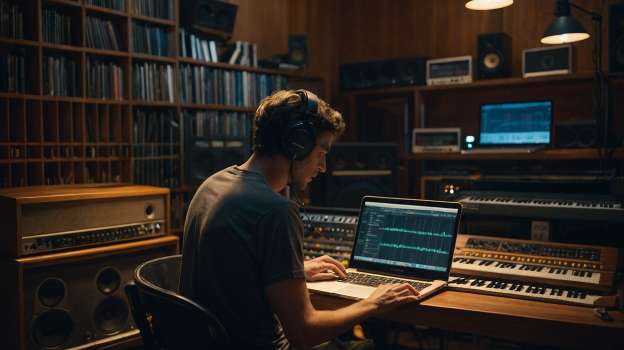There is a lot of talk about the importance of owning your masters these days. Read our guide on how to maintain control over your music, and find out what it really means to be signed with most major and indie labels.
What is a master recording?
A master recording is the original sound recording of a song or album. This is the version from which all copies (digital or physical) are made. Ownership of the master gives the holder full control over how this recording is used, licensed, and distributed. It is the most authentic and definitive example of an artist's work.
Why is it important to own my masters?
As an artist, owning your master recordings gives you the legal rights to freely use and maximize your opportunities to earn money. It gives you full control over your music. With a master recording, you can license the recording to third parties, such as TV shows, films, commercials, or even for sampling by other artists. If your master belongs to someone else, such as the record label, music producer, or others, they have the right to license the recording and collect all royalties.
What is the difference between publishing rights and master rights?
Publishing rights refer to the rights in a musical composition, lyrics, and music. The master is the original sound recording. The difference is that a single musical composition (such as lyrics) can appear in hundreds of different sound recordings (covers, remixes, etc.).
 The Sound Recording = Master Rights
The Sound Recording = Master Rights
Owning your masters means you own the copyright to the original sound recordings of your music. The copyright of the sound recording is generally owned either by the artist or the record label they are signed to. The person who owns the master recordings will earn royalties when the song is played or reproduced (including radio, streaming, downloads).
 The Composition = Publishing Rights
The Composition = Publishing Rights
The composition, also known as “Musical Work,” includes the underlying musical elements, structure, and composition of a song. This can also include lyrics. Publishing rights are generally owned by the original author or composer of the song.
There are three main types of royalties that come from publishing rights:
- Performance Royalties: Royalties generated from live performances of a song, such as at festivals, concerts, radio play, or in public spaces.
- Mechanical Royalties: Royalties from the production of physical copies of a song (such as CDs and vinyl records) and digital streams and downloads.
- Sync Licensing Royalties: Royalties generated when a song is broadcasted through AV media (commercials, films, video games, TV shows, etc.).
Performance royalties relate to how an artist's music is used. This can range from digital or physical formats, live performances on stage or in public settings, or broadcast on the radio.
Where does the money come from?
In a traditional deal with a record label, revenues will come from multiple sources. The record label will recoup their investment before you see any money, depending on advances, recording costs, touring, and promotion expenses they have paid. After all expenses are recouped, the artist will receive revenue based on the percentage agreed upon with the record label.
Revenue will come from things like:
- Master rights
- Physical and digital sales
- Sync licensing
- Touring
- Merchandise
- Remixes and sampling
- Sponsors
- Features
Traditional Record Deals vs. Licensing Agreements
In short, many traditional record deals will ask an artist to relinquish their master rights to the record label for a certain period. This means the artist is prevented from releasing music with any other label, distribution partner, or even another artist during the contract period. It also means that any recordings made by the artist are owned by the record label during this period, sometimes forever. In return, the artist receives an advance on future royalties.
A better alternative is a licensing agreement, where you "loan" your recordings to the record label for a limited time instead of relinquishing your rights for the entire duration of the copyright. When the licensing period is over, you regain full ownership of your music. By owning your master recordings, you remain in control of your career and earnings.
Negotiate Your Rights
- Understand the Period: How long are you potentially locked into the deal? How many future songs does the record label have the right to? How long do they have the rights to your music?
- Understand Royalty Payments: There is usually a recoupment element, so you won't see a royalty right away. Understand what is and isn't recoupable. Make sure you understand what you will earn during the recoupment period beyond your advance.
- What Can the Record Label Do for You: Are they investing in marketing and exposure? Is it worth assigning them your rights at a time when you can launch your career independently?
BeMajor: Keep Ownership of Your Masters and Control Your Career
At BeMajor, we are dedicated to giving artists full control over their careers. Our platform allows you to finance your music projects directly through your fans while retaining 100% of your rights. By owning your master recordings, you can decide how your music is used and profit from it without giving up control to a record label.
Create a project on BeMajor today and get support from your fans to realize your musical vision while retaining ownership of your work. Let's change the music industry together, one master at a time.

About Jules Wolfson
Partnership Director at BeMajor and CEO at Nexus Music
Jules Wolfson is a Danish record producer, songwriter, and music executive active since 2001. He's earned over 150 gold and platinum certifications, multiple Danish Music Awards, and collaborated with international stars like Usher and Timbaland. Wolfson is known for developing top Danish acts like Nik & Jay and Cisilia, consistently ranking as one of Denmark's most-played musicians on radio.

